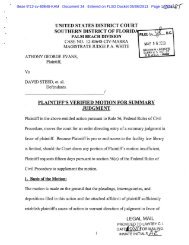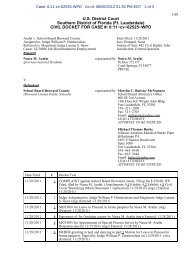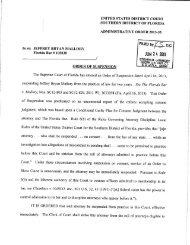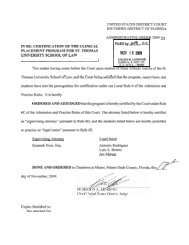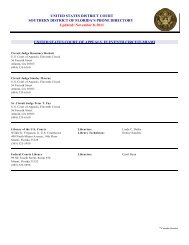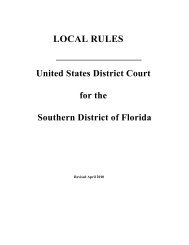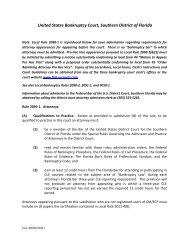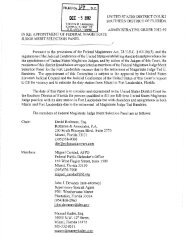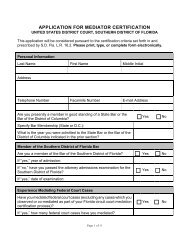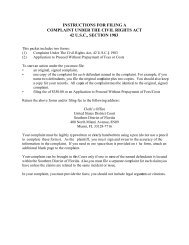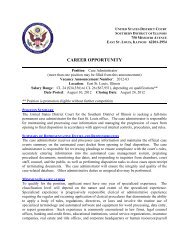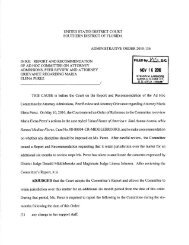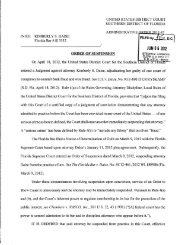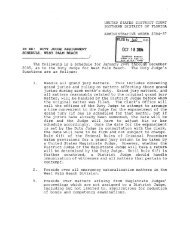JAN j 6 2010 - United States District Court
JAN j 6 2010 - United States District Court
JAN j 6 2010 - United States District Court
Create successful ePaper yourself
Turn your PDF publications into a flip-book with our unique Google optimized e-Paper software.
(5) Stays or Limitation of Discovery. Normally, the pendency of a motion<br />
to dismiss or motion for summary judgment will not justify a unilateral<br />
motion to stay discovery pending a ruling on the dispositive motion.<br />
Such motions for stay are generally denied except where a specific<br />
showing of prejudice or burdensomeness is made, or where a statute<br />
dictates that a stay is appropriate or mandatory. Sec,—e.g.—See, e.Q.,<br />
15 U.S.C. § 77z-l(b)(l), the Private Securities Litigation Reform Act of<br />
1995. This policy also applies when a case is referred to <strong>Court</strong> annexed<br />
mediation under Local Rule 16.2. Where a motion to dismiss for lack of<br />
personal jurisdiction has been filed pursuant to Federal Rule of Civil<br />
Procedure 12(b)(2), discovery may be limited to jurisdictional facts by<br />
<strong>Court</strong> order.<br />
E. Completion of Discovery.<br />
(1) Discovery Completion. Local Rule 16 .l-rA(a) sets discovery completion<br />
dates for differentiated case management tracks. The Judges may have<br />
individual methods extending the deadline, however, each Judge enforces<br />
Local Rule 26.l-rF-(f), which requires that discovery be completed and not<br />
merely propounded prior to the discovery cutoff date.<br />
(2) Extension of Time for Discovery Completion. Occasionally, the <strong>Court</strong><br />
will allow additional discovery upon motion, but counsel should not rely<br />
on obtaining an extension. When allowed, an extension is normally made<br />
only upon written motion showing good cause for the extension of<br />
discovery (including due diligence in the pursuit of discovery prior to<br />
completion date) and specifying the additional discovery needed and its<br />
purposes. Motions for extension of discovery time are treated with<br />
special disfavor if filed after the discovery completion date and will<br />
normally be granted only if it clearly appears that any scheduled trial<br />
will not have to be continued as a result of the extension.<br />
II. DEPOSITIONS<br />
A. General Policy and Practice.<br />
(1) Scheduling. A courteous lawyer is normally expected to accommodate<br />
the schedules of opposing lawyers. In doing so, the attorney can either<br />
pre-arrange a deposition, or notice the deposition while at the same time<br />
indicating a willingness to be reasonable about any necessary<br />
rescheduling. Local Rule 26.l-rJ(i) requires at least five working seven<br />
(7) days' notice in writing to every other party and to the deponent (if<br />
a non-party) for a deposition in this State, and ten working fourteen<br />
(14) days' notice for an out-of-state deposition. Noncompliance obviates<br />
the need for protective order.<br />
Notwithstanding the foregoing, in accordance with Federal Rule of Civil<br />
Procedure 32 (a)-(-3-)-(5) (A) . no deposition shall be used against a party<br />
who, having received less than eleven calendar fourteen (14) days' notice<br />
of a deposition as computed under Federal Rule of Civil Procedure 6(a),<br />
has promptly upon receiving such notice filed a motion for protective<br />
order under Federal Rule of Civil Procedure 26 (c)42-Hl) (B) requesting<br />
that the deposition not be held or be held at a different time or place<br />
89



